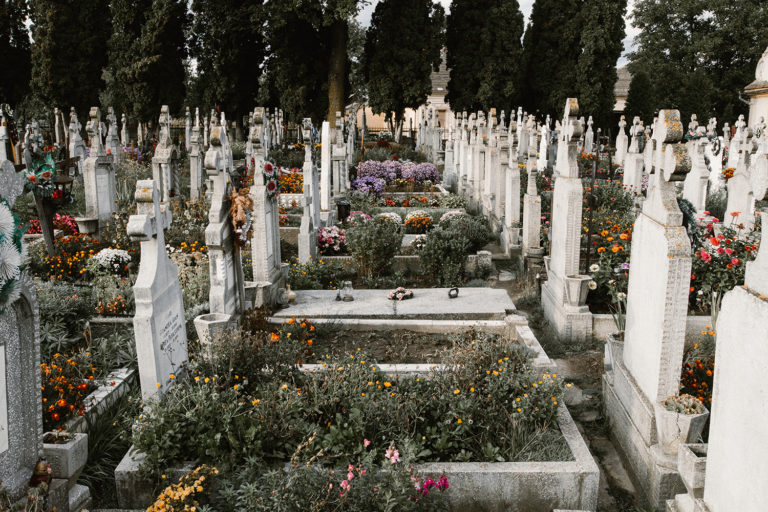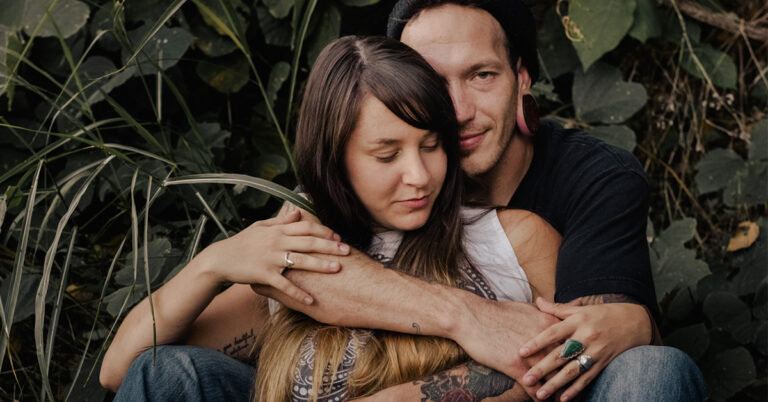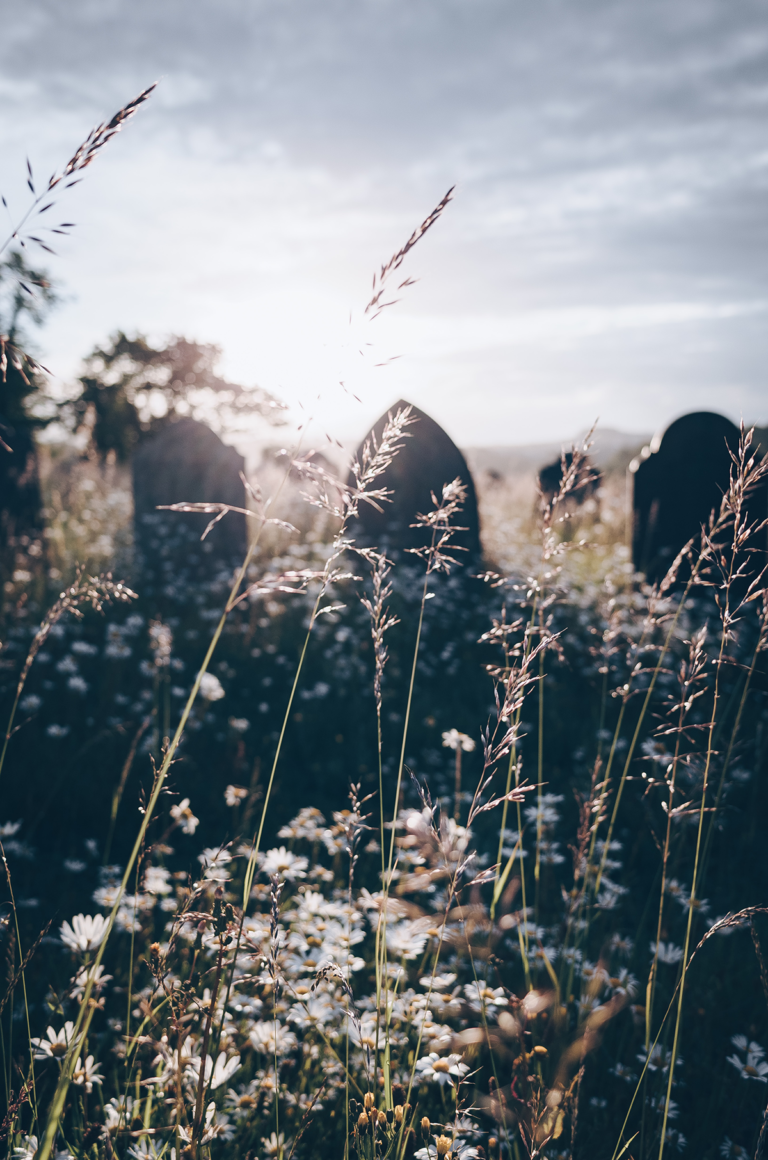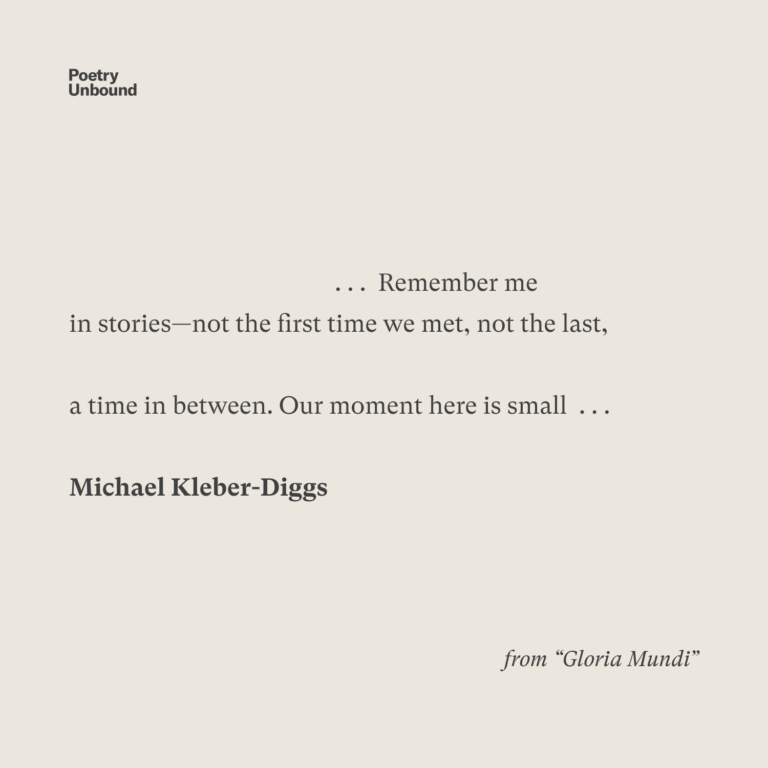Mercedes Doretti
Laying the Dead to Rest
With an Argentinean scientist, we explore the human landscape of forensic sciences and its emergence as a tool for human rights. Doretti has unearthed bones and stories of the dead and “the disappeared” in more than 30 countries, including victims of Argentina’s Dirty War, over two decades. She shares her perspective on reparation, the need to bury our dead, and the many facets of justice.
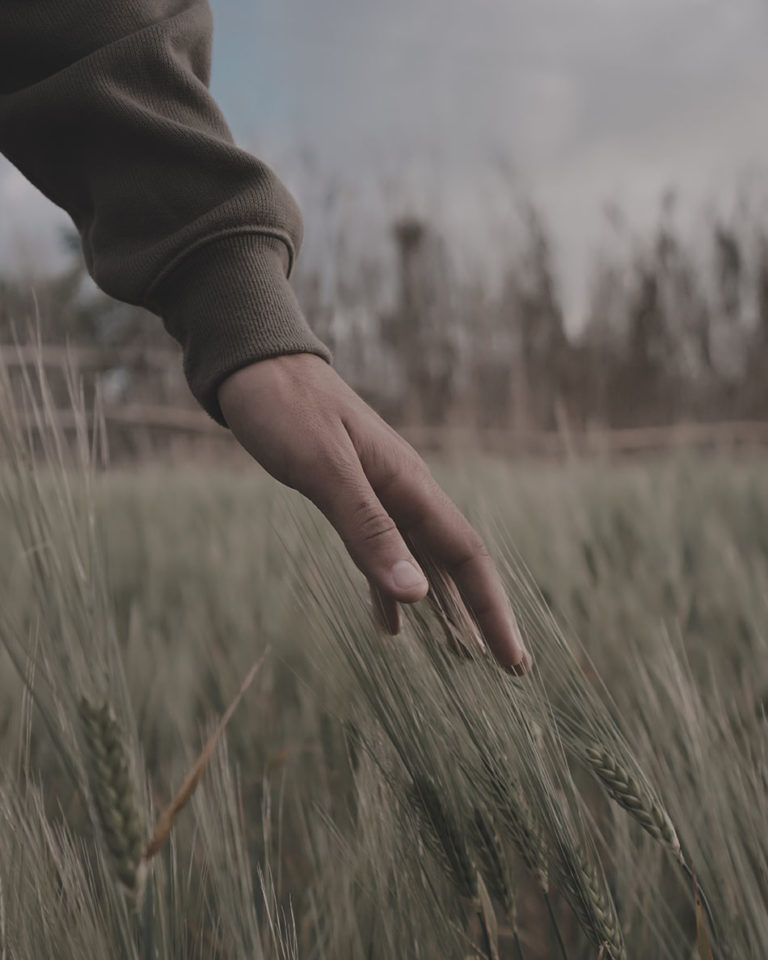
Image by Youssef Aboutaleb/Unsplash, Public Domain Dedication (CC0).
Guest
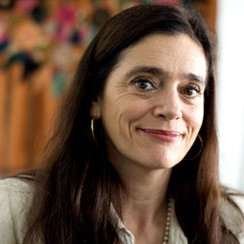
Mercedes Doretti is co-founder and senior researcher of the Argentine Forensic Anthropology Team (EAAF). She received a MacArthur "genius" grant for her work in 2007.
Transcript
April 15, 2010
KRISTA TIPPETT, HOST: I’m Krista Tippett. Today we explore the world and work of Mercedes Doretti, a leading forensic anthropologist, an archaeologist of political crimes. We explore the emergence of forensic sciences as a tool for human rights. This is reparation for the living by returning and telling the stories of the dead.
MS. MERCEDES DORETTI: It’s extremely rewarding and heartbreaking also, how families will tell you what it means for them to recover the remains of their loved ones. They always say that they can finally find a place where they can put flowers, that they can rest, that they can now also move on to other things of their lives, because what they always say, you know, in almost every country where we go is that their life had been paralyzed the moment their loved one disappeared.
MS. TIPPETT: This is Speaking of Faith. Stay with us.
[Announcements]
MS. TIPPETT: I’m Krista Tippett. Forensic sciences have entered 21st-century imaginations from CSI to Indiana Jones. This hour, we explore the human landscape of this work and its emergence as a tool for global human rights. Mercedes Doretti is a forensic anthropologist who found her calling as a young woman in her native Argentina, unearthing the bones and the stories of the thousands of dead and disappeared civilians from Argentina’s so-called “Dirty War.” We’ll hear poetry that gives voice to this human experience by people who lived through it, and we’ll hear the unusual perspective Mercedes Doretti has gained on reparation, the human need to bury our dead, and the many facets of justice.
From American Public Media, this is Speaking of Faith, public radio’s conversation about religion, meaning, ethics, and ideas.
Today, “Laying the Dead to Rest: Meeting Forensic Anthropologist Mercedes Doretti.” Mercedes Doretti is a co-founder and leading figure of the Argentine Forensic Anthropology Team. Over the past three decades, this organization has grown from six to 47 members with projects in over 30 countries. From El Salvador to Bosnia, from East Timor to Ethiopia, Doretti and her colleagues unearth and identify the remains of people who’ve been caught in civil unrest, often kidnapped and murdered by their own governments.
The team brings skill in multiple disciplines, including anthropology, genetics, ballistics, osteology, and radiology. They are archaeologists of political crimes, archaeologists not of ancient history but of the contemporary past. And they experience this work as a crucial form of reparation for the living, for people who themselves are classified under international law as victims of torture because of what has happened to their loved ones.
MS. DORETTI: The families of the disappeared people are considered victims of torture because of the pain that they are submitting by the uncertainty of not knowing. Not knowing what happened, if the person is dead or alive, it’s devastating. You know, there’s nothing — you can’t rest.
MS. TIPPETT: Mercedes Doretti was 16 years old in 1976 when a military junta came to power in Argentina that disappeared more than 10,000 people in the space of seven years. The junta maintained control by terrorizing its own citizens, kidnapping, torturing, and killing, dropping some bodies into the ocean, and burying others in unmarked graves. Mercedes Doretti learned her craft from a globe-trotting Texan named Clyde Snow, a towering figure in the field of modern forensic anthropology. He came to Argentina in 1984 at the invitation of an organization called the Grandmothers of Plaza del Mayo, women seeking their children and grandchildren who disappeared.
As I began to speak with Mercedes Doretti, I wanted first to understand how this part of her own personal history formed her and the work she does now. Her mother was a prominent journalist who helped expose the government’s actions. She herself was in college studying anthropology when Clyde Snow arrived on the scene.
MS. TIPPETT: I’m just curious about being in college in those years when that was happening in your society. How were you responding just on a human level to this violence that was taking place and this injustice that was taking place?
MS. DORETTI: There was frankly very little one could do or very little most people, including myself, did during those years. The people that were actually going out and denouncing this were mostly the human rights organizations — I was not part of any of them — that were mostly at that time formed by relatives of disappeared people and also by lawyers that were representing them and other activists. But it was extremely dangerous. In fact, several of them disappeared. And journalists as well. I mean, I think my mom in that respect also was saying a lot of things on the radio and because of that, you know, she and her family received death threats during all the dictatorship. So it was a time in which you kept a lot of your anger inside. We would talk, you know, among friends but even that you would do in a careful way.
It was also very frustrating on an intellectual level, because studying anthropology itself was something not among the careers that were well seen by the government, and so anthropology was closed for a year, then reopened, but with a very limited number of students. We couldn’t read basic books like Levi-Strauss or Freud because it was considered subversive. I mean, of course that was very mild compared with other things that were going on but it was a very sad time in many different ways, where you would not see any hope.
MS. TIPPETT: Right. I guess when you’re describing that, then it’s clear to me that Clyde Snow was a really important person in your life. Kind of makes me imagine that when he came onto the scene, I guess he was invited there by an organization, you know, which is heartbreaking, who were searching for children who had disappeared with their parents. And it seems he offered a way to become involved, I guess.
MS. DORETTI: Yeah. It was in the beginning of democracy in the summer of 1984, and he was and he is an extremely important figure in my life. But at that time I have to say it was not like a natural thing in the sense that it’s not that we said or I said, ‘Oh, OK. Yeah, great. We can work on this now and do something in this area.’ It was — we were quite reluctant, actually, in the beginning to start working in this area. Because of many different reasons. Partly because we had no idea about how we were going to react. I didn’t know.
MS. TIPPETT: So you hadn’t actually done forensic anthropology before.
MS. DORETTI: No. We hadn’t done any forensic work up until that moment so there was a fear of how would you react to working in that field, getting into a cemetery, working in a morgue. You know, that’s very different than working on an archaeological site of 10,000 years ago or something like that.
MS. TIPPETT: Right.
MS. DORETTI: Then we were also scared if there was going to be another coup, because we thought, well, if we survived the previous one, certainly if there is another coup we will have to leave. So we were also thinking this decision that we take now implies many other things eventually.
MS. TIPPETT: Right. Right.
MS. DORETTI: So we, the group of students that initially started with him, decided to do it because, you know, we couldn’t say no. But it’s not that we jumped into the opportunity.
MS. TIPPETT: OK.
MS. DORETTI: It was much later, that.
MS. TIPPETT: You know what; I’m so intrigued when I read about Clyde Snow, that he had worked on finding the remains of Joseph Mengele in Brazil, the Nazi doctor; that he had reinvestigated the remains of Custer and his men at Little Big Horn; and that he is the world’s expert in a field that I’d never heard of: osteobiography, the art and science of reading a life story from a person’s bones. Is it true that no two bones, like no two snowflakes, are exactly alike? Is that right?
MS. DORETTI: Well, yeah. Pretty much. You could really see, you know, when you’re looking at a pair of femurs or a pair of tibias coming from the same person, you could see a lot of similarities that immediately when you see a femur or a tibia from someone else you could very well see the difference. And then you see the difference between the right and the left, obviously. Yeah.
MS. TIPPETT: How did you react when you first started doing that? I mean, how did you first start? What was the first project that you took up with, with Clyde Snow?
MS. DORETTI: It was an individual exhumation, an exhumation of an individual grave in a cemetery in the outskirts of Buenos Aires. Clyde was really amazing in the sense that, you know, we were just a group of students — very young, full of questions, fear, and rebellion too — and he was actually leading us step by step. “OK, we’re going to this, then we do that. Don’t worry, I’m here,” and on that note. My first reaction, I was even surprised myself about it because it was when we started digging and we started encountering the remains. I was fine. I was just very worried about all the details, about looking at the bones, looking at the soil, sifting the soil, just taking photos, this and that. And I realized I could do it. That somehow at that moment I had some defense mechanism or however you want to call it that I was very concentrated on what I was doing and I was not thinking a lot of other things that could have stopped me emotionally from doing that.
MS. TIPPETT: I was reading an article that was in The New York Times in 1987 about you and your colleagues. They called you “four unlikely forensic sleuths.” And there was this chilling sentence. They said, “As for exhumations elsewhere in Argentina have revealed the anonymous dead were mostly young people slain by a single gunshot wound to the head.” So, I mean, were you working with the bodies of people close to your age?
MS. DORETTI: Yeah. That was the other thing. I mean, that it was not that we were going to dig up bodies from people that were too far away from us not only in time but also in age. I mean, these were people that were the same age as we were when we were exhuming them. And then the trauma on the skull, I mean, I have no idea about guns or gunshot wounds or anything before, and seeing a skull that basically exploded due to the impact of a bullet, it’s very disturbing. But I think what we also learned was how your work has a lot to do with reparation ¬— from the most physical sense of putting together those pieces of skulls back, you know, glue them basically, so that you can understand the entrance and the exit and how that person died, to everything that comes after that with the families of the victims. And I think often people, when they think about our work, they stay more on the gruesome side of it, which of course exists, but sometimes they don’t see all the rewarding part and the reparation part that it means to be able to do this kind of work.
MS. TIPPETT: I’ve been really interested when I read about — I mean, you’re now in 40 countries. You’ve done many work. I guess your organization has over 40 people, but it sounds like when you go into a new project, when you accept an invitation, you don’t start with bones. You don’t start with the dead. You start with the living.
MS. DORETTI: Exactly. Yeah. A good relationship and the trust of the families of the victims with the forensic team is as important as the science that you are applying. If people don’t trust you, if they don’t believe in what you’re doing, they’re not going to believe in your results, or they will doubt about them and they won’t be able to, in a way, heal and close that story, particularly in human rights cases. And this is something we always try to transmit to other forensic people that have not worked in this field. It is very important to build up our relationship with the families of the victims. I think also that they have the rights of this.
I mean, I think that forensic people should always take into account that they are serving other people and that their investigation should be transparent and open. But in human rights cases, this is particularly important because the families of victims have, for the most part, been denied the right to know, the right to know what happened with their loved ones, where are they, what happened to them. And often they’ve been told, “You’re lying,” or “Your loved ones are lying. They didn’t disappear. They are somewhere else. They are traveling around. They are with their comrades,” or things of that sort. So there’s a lot of mistrust from the side of the families of victims towards forensic people that in our countries mostly work under the judiciary or the government or police.
So the first thing we do is meet with the families and with the human rights organizations. We always work, also, at the request of someone. We don’t parachute into a situation unless we’re invited.
MS. TIPPETT: Right.
MS. DORETTI: And hear them. Hear what they have to say, what are their concerns, what is the problem, what do they think, the questions they want us to try to answer, try to see if we can do something or not, and give them often a workshop on what is forensic sciences in this kind of investigation. What are the kind of things that we’re going to be doing, step by step. So that they understand what we’re going to do and they can ask us questions or they can ask us if, for example, often people with different religions may like us to handle the bones in different ways.
MS. TIPPETT: Right.
MS. DORETTI: For example, if we’re in a Muslim country, the burial ceremony is very different than on a Catholic one. And there’s a number of things that are not a problem at all for us to do, but that represent something important for families of victims in terms of how we handle the remains. And things of that sort that we think are important.
MS. TIPPETT: You know, as I was thinking about this notion of your work as a crucial part of reparation, as healing, it did occur to me this very simple need that human beings have to be taken seriously and to be believed and the stories you tell are of people who haven’t been taken seriously or believed about these absolutely devastating events of the loss of their loved ones.
MS. DORETTI: Yeah, absolutely. But it’s also sometimes people saying, ‘Why are you giving them talks on forensics? You know, these are not forensic people. They’re not going to be able to understand.’ And of course people understand. I mean, people in general understand much more than one would think, and there are ways in which you can explain a genetic test. There are ways in which you can explain what a fracture does in a bone and how it heals and why we’re seeing that old fracture now in this particular bone. And I think as in any case, I mean, when a daughter or son or a very close relative of yours died in normal circumstances, you will ask the doctor involved to explain …
MS. TIPPETT: Right. Right.
MS. DORETTI: … as much as he can about what happened. The same thing is in these cases, but with the extra that these people have been denied knowing this for years, sometimes for decades.
MS. TIPPETT: Forensic anthropologist Mercedes Doretti. Alicia Partnoy is a poet and human rights activist who became one of Argentina’s disappeared and one of very few to survive that fate. In 1977, when she was the mother of an 18-month-old daughter, she was imprisoned and tortured at a secret detention camp called The Little School. Here she is reading one of her poems about beginning to give voice to the human side of a traumatic national history that Mercedes Doretti tells by way of science. This poem is titled “Testimony.”
MS. ALICIA PARTNOY: his microphone with its cable coiling around it, bows to me. I walk up to it, open my eyes open my book open my mouth. That’s right, I open my mouth wide and begin my story. They say I speak too softly, that I am practically mumbling, that they can’t hear the screams piercing. I open my memory like a rotten cantaloupe. They say I have not managed to forcefully convey the pitiless rage of the cattle prod. They say that in matters such as this nothing must be left open to the imagination or to doubt. I take out the Amnesty report and begin speaking through that ink. I urge: “Read.” I, in my turn, coil around my bowing accomplice, this microphone. I urge action as a prescription, information as an infallible antidote and, one every knot is untied, I recite my verses. I resist. I am whole.
[Sound bite of music]
MS. TIPPETT: I am Krista Tippett, and this is Speaking of Faith from American Public Media. Today, “Laying the Dead to Rest.” We’re encountering the world and work of Mercedes Doretti, one of the world’s leading forensic anthropologists. She says that one of her hardest projects was in El Salvador, where her team exhumed many bodies of children at the site of a massacre of over 700 people. She has directed projects at mass graves and sites of atrocity in over 30 countries, always at the request of the victims’ families and inviting their participation in every aspect of the work.
MS. TIPPETT: The things you’re explaining to them are also in some ways pretty gruesome, right, I mean, that they should have to understand certain kinds of fractures or bullet wounds. And I was watching a documentary, it’s part of the documentary that you helped make, where a man — and I’m just assuming that this is maybe the kind of thing that might happen routinely — he’s walking you through a site and he’s describing in pretty graphic detail, but in a very matter-of-fact way how this entire family was killed, the father, the mother, the children. And I was struck by the matter-of-factness of the questions in some of this. “Who dug the hole?” “Was this hole already here?” But I wondered if — do you experience that tracing that kind of excruciating detail of what happened is also the beginning of, I don’t know, of a kind of healing or repair that wasn’t possible when it was just this unsolved mystery?
MS. DORETTI: Yes. I think that it’s partly what you were saying before, that when people feel that you’re taking them seriously, that you’re listening to what they’re saying, that you’re answering their questions about what you know, what you don’t know, and all that, I think, yeah, that is where part of the healing process begins. I have to say, on the other hand, that I think sometimes there’s an overuse of the term “healing” in the sense of oh, OK, people found the remains, there is a trial, then healing is achieved. Unfortunately, sometimes the things that happened are so devastating that I think these steps are very, very important, but that you probably never fully heal from this event.
MS. TIPPETT: Well, I’m also struck in your writing by how you emphasize the time that this takes, I mean, even the time that you want to give the investigation itself, and that’s that quite hard for people when what they really want is to have answers and get through it. You know, it made me think of conversations I’ve had with people who are involved in South Africa’s process of truth and reconciliation and them saying that they could get truth right away, but that one of the things they realized in that process is that reconciliation was going to be a matter of years and generations.
MS. DORETTI: Well, see, that’s the other word. I think is often …
MS. TIPPETT: Yeah.
MS. DORETTI: … used too often too quickly. I mean, first of all, most of the people who perpetrated the crimes are not asking for forgiveness. The South Africa example is an exception within and yet, you know, it only implies some people that were actually looking for amnesty. So it’s not — I don’t want to put a question mark on any of them but, I mean, they were given something, their freedom basically, out of confessing a crime and apologizing for it. But in general, in most of the cases, there are no apologies to any of the victims or the families. So who are you going to reconcile with? Who’s asking you for forgiveness? So I think that maybe future generations may understand history better and eventually through justice and through truth you may be able to kind of reconcile yourself with what happened.
MS. TIPPETT: Right.
MS. DORETTI: But it’s a different kind of reconciliation of reconciling with the perpetrators.
MS. TIPPETT: Well, tell me this. Do you still have family in Argentina? I’m imagining you do.
MS. DORETTI: Yeah. Almost all my family is there.
MS. TIPPETT: How do you experience how that has been reconciled, that period of horror and disappearances? And do you think that the work you did — what part has that played in it?
MS. DORETTI: You mean for the country?
MS. TIPPETT: Yeah. Or just for people you know. Do you have some perspective on that because this number of years has passed and because you were involved in this piece of it?
MS. DORETTI: Well, for example, in our country there’s been several things. There’s been a major trial, that I think was extremely important at the beginning of democracy after dictatorship, of the junta members that lasted for a couple of years. I think that was very, very important because it left no doubt about what happened, after like two years of having every newspaper dedicating six to 10 pages about testimonies of victims, and because it was also done from the top down. In other words, it was taken as a state terrorism, which I think it’s what it was. It was not the action of a single lieutenant that got a little crazy here or there, but it was actually a policy directed from the state with more than 300 little detention centers all over the country and all of the security forces involved. And so in that respect, I think that trial was very important.
But then we have several impunity laws that precluded the trials to go on, and almost all investigations stopped. We continue with investigations and we …
MS. TIPPETT: Your forensic investigations.
MS. DORETTI: Yes. But there was no prosecution involved. And now, after like 20 years since the last trial, we have more than a thousand ongoing prosecutions all over the country because impunity laws have been nullified. And some of the old trials started again and new trials started again.
MS. TIPPETT: Justice is a many-layered thing, I guess.
MS. DORETTI: Exactly. I really think that justice is very important. Justice through the judiciary, through courts, is very, very important.
MS. TIPPETT: What about this process, though, of individuals reconciling these losses within themselves? And I suppose that if it happens with one person, perhaps it affects families and communities. I mean, in Argentina or elsewhere, have you believed that this work that you were engaged in with people of finding and identifying and at least putting the bones to rest of their loved ones, that that made a difference in terms of how they came through this in the long term?
MS. DORETTI: Yes. Yes. Frankly, that’s one of the main reasons why we do this work. I mean, it’s extremely rewarding and heartbreaking also how families will tell you what it means for them to recover the remains of their loved one. They always say that, you know, they can finally find a place where they can put flowers, that they can rest, that they can now also move on to other things of their lives and to go back to their family life. Because what they always say, no matter what culture, and — you know, in almost every country where we go, is that their life had been paralyzed the moment their loved one disappeared.
MS. TIPPETT: It’s a different kind of loss when there’s a disappearance as opposed to a death.
MS. DORETTI: I think so, absolutely. So much so that, for example, in international law, the families of the disappeared people are considered victims of torture because of the pain that they are submitted by the uncertainty of not knowing. You know, there’s no scale to compare the pain. But, of course, if someone has been executed or assassinated, it’s an enormous loss, but not knowing what happened, if the person is dead or alive, if there’s something else you get to, if there’s another place maybe that they’re holding that person and that you should do something to try to find that person, but you can’t, it’s, it’s, it’s devastating. There’s nothing — you can’t rest.
MS. TIPPETT: Forensic anthropologist Mercedes Doretti. Here’s another poem written and read by Argentinean poet and detention camp survivor, Alicia Partnoy. This is titled “Survivor.”
MS. ALICIA PARTNOY: I carry my rage like a dead fish, limp and stinking in my arms. I press it against my breast, whisper to it, people on the streets flee from me … I don’t know: is it the smell of death that makes them flee or is it the fear that my body’s warmth might bring rage back to life
[Sound bite of music]
MS. TIPPETT: Alicia Partnoy’s poems were written in Spanish. It is a moving experience to hear her recite them in both languages. In Spanish, the pace is quicker, the tone more impassioned, very powerful. We wanted you to hear both versions and be able to read the text so we’ve made these recordings available on our Web site along with free MP3s of this program and my unedited conversation with Mercedes Doretti. Look for links to all these features and more at speakingoffaith.org.
[Sound bite of music]
MS. TIPPETT: After a short break, Mercedes Doretti on the human need to bury our dead in order to move on with life. Also, more poetry by Alicia Partnoy. I’m Krista Tippett. Stay with us. Speaking of Faith comes to you from American Public Media.
[Sound bite of music]
[Announcements]
MS. TIPPETT: Welcome back to Speaking of Faith, public radio’s conversation about religion, meaning, ethics, and ideas. I’m Krista Tippett.
Today, “Laying the Dead to Rest.” We’re exploring the human landscape of global forensic anthropology, an art and science of reparation for the living by returning and telling the stories of the bodies of the dead.
Mercedes Doretti is a co-founder and a leading figure of the Argentine Forensic Anthropology Team. She’s received a MacArthur “genius” grant for her pioneering work from her native Argentina to Ethiopia, from Bosnia, to East Timor. She and her team do their work, as she’s been telling me, at the invitation of and in service to the living, the families of people who have been kidnapped, perhaps tortured, and murdered, often by their own governments.
MS. TIPPETT: It is a question in my mind, just because I haven’t experienced this and most of us haven’t experienced this. It’s a kind of mystery — what is it about human beings that we need to see and honor the actual bodies, right, the remains of people we love? I mean, do you have an understanding of that as an anthropologist that you wouldn’t have had?
MS. DORETTI: I know, it’s really amazing. I mean, when you see the Neanderthals, at least that’s the earliest record that we have …
MS. TIPPETT: Right.
MS. DORETTI: … of taking care of the dead. And then you read Antigone, and just a little piece of earth will do to put the remains at rest. But that little thing has to be done; that rite of passage needs to be accomplished. It’s amazing. But I’m part of it as well.
MS. TIPPETT: Right. Right.
MS. DORETTI: As a human being. You know, I lost my older brother, nothing to do with politics or disappearances, but I — when that happened I thought, well, I’m so grateful that at least we have a wake. We bury him. We know where he is.
MS. TIPPETT: You didn’t take that for granted.
MS. DORETTI: No.
MS. TIPPETT: No. Yeah, and you were saying earlier that it’s a different kind of grief or it’s a different kind of pain for people when their loved one has disappeared as opposed to a death. What is the affect on them of knowing that their loved ones were tortured? Is that something that you have experienced also?
MS. DORETTI: Well, first of all, in most cases that we work, we are dealing with skeletal remains. So torture is something seldom seen on skeletal remains, because it mostly affects soft tissue.
MS. TIPPETT: OK.
MS. DORETTI: That it’s no longer there in most of the cases where we work. But in general, just the fact of seeing bones broken, what we call perimortem fractures, fractures that occurred around the time of death that didn’t allow the bones to heal and so the bone is basically broken, and see as a series of evidence such as bullets. It’s a very difficult thing to watch for the families of victims. We always ask them if they want to be there or not. What we think is we have to give them the option, and then — which is something that often it’s not given to them and so it raises another wave of doubts about what happened, how the remains were found, and so on. And so we always say, “If you want to come, you’re welcome,” and we often bring them with us. And the same thing when we identify the remains. We always tell them, “Do you want to go to the morgue with us and we show you the remains and we explain to you what we’ve seen on the remains and why we think this is your daughter or your son?” And most of the time they want that. It’s very painful and they always say it’s — you know, they cry and they react as if the person had died the day before. It’s very, very painful, but they always say the same thing, that most of the time they do want to see this. They need to see this, need to see the remains. And even if it’s very painful, they want to know as much as we know.
MS. TIPPETT: Right.
MS. DORETTI: So we go with them.
MS. TIPPETT: Hmm. I’m wanting to hear maybe a story of a specific place, and maybe this is an experience you’ve had recently or maybe it was just one of those moments that seemed cathartic to you in your career, you know, a site or a person or a family that helped you think about what this work is and why you do it and why it matters.
MS. DORETTI: Hmm.
MS. TIPPETT: It’s a big question.
MS. DORETTI: Yeah. Every time we have an identification, I feel an enormous relief. So now I’ve been working in Mexico for a number of years, in the border, in Ciudad Juárez, and every time we have to communicate results …
MS. TIPPETT: And that’s where hundreds of young women have disappeared …
MS. DORETTI: Right.
MS. TIPPETT: … over the last 15 years.
MS. DORETTI: Right. And, you know, families say, ‘Well, finally after all these years we have some information. This is very painful, but , you know, we at least know what happened.’ And it’s always the same thing. It’s the families of the victims, who, their words, their stories, that keep you going. And from time to time, we get justice — not as often as we get identifications — and that’s also a very important moment.
MS. TIPPETT: In this article in The New York Times in 1987, I don’t know if you remember this …
MS. DORETTI: Yes, I do. Yeah.
MS. TIPPETT: Yeah. There’s a quote from you that all of you were in your 20s, and it says you all plan to move on to other work.
MS. DORETTI: Yeah.
MS. TIPPETT: And you said, “We all have other ambitions, ideas more connected to life.”
MS. DORETTI: [Laughter] Yes, exactly. Because at the beginning, we frankly saw it as, OK, we’re going to do this because we cannot say no. We should be consistent with what we believe. We cannot turn our backs to this. But then we’ll do it for a few years, and then we’ll go back to a normal academic life. Well, some members of the team — from that original team — did that. I found an enormous passion in what we were doing and even though at times I thought, ‘Well, should I do something else? This is too difficult or too painful,’ or something like that, I could not think about anything that makes me so passionate about it. I mean, I think there’s very few people that work on what they want and what they like and for that I feel very privileged.
MS. TIPPETT: It strikes me, when I talk to you and I read about the work you do, you don’t reverse the indignity that was done or the horror that was done, but in some ways somehow what you’re doing is a counterweight to it. I mean, you’re making death matter, which somehow is a statement that life matters.
MS. DORETTI: Exactly. You said it perfectly. Yeah. It is so much the work for the living. That’s what I also learned. I just didn’t know at the beginning. I was also more, as people from outside this job will see it, I was also more impressed at the beginning by all the dead part of it. It took me awhile to understand how this is so much connected with the people that are alive and to dignify the death of the victims.
[Sound bite of music]
MS. TIPPETT: Forensic anthropologist Mercedes Doretti. Here again is Alicia Partnoy, this time reading from the work of the Chilean poet Marjorie Agosín, who escaped General Pinochet’s regime. Agosín has written poetry about the mothers of Argentina’s disappeared and about the human anguish in the city of Juarez in Mexico where Mercedes Doretti has worked on some of the unsolved disappearances and murders of over 400 young women.
MS. ALICIA PARTNOY: “How Many Times Do I Talk with My Dead?” by Marjorie Agosín.
How many times do I talk with my dead? And their hands are rough and wrinkled, and I ask them things and their faces are a memory of sorrows, and the night threatens us in its tempestuous fall, but I talk with my dead which perhaps are yours, and I cover them, saturate them with my silent sorrow and with my tear-drenched eyes. I always bid farewell to that body, to those eyes that seem like a river of silence. And this is how I learn to tell them things, to promise them a blossoming, flowery garden, a history, a beginning, a promise, and it is so incredible how I love this dead one, who is not mine, who is not a cadaver either, but a waterfall, a dialogue, a shore to be crossed.
MS. TIPPETT: I’m Krista Tippett, and this is Speaking of Faith from American Public Media, today exploring the world and work of Mercedes Doretti, a leader in applying forensic sciences as a tool for justice, reparation, and human rights.
MS. TIPPETT: Clearly, there’s a moral and ethical, a really strong moral and ethical framework to what you do. And yet, I mean, what you do also confronts you all the time with the terrible things human beings do to each other. How do you make sense of that or how do you live with that?
MS. DORETTI: Well, I don’t think we change, you know, that human beings change much. I’m not very optimistic on that side. Sometimes we say that we’re nihilist idealists.
MS. TIPPETT: You and your colleagues?
MS. DORETTI: It feels like a contradiction in terms. But I think men will always be the same. I don’t think we’re going to change. We’ve been doing these awful things to each for millions of years. At the same time, I think that we are improving by working on human rights and as a serious — on limiting as much as we can, you know, human suffering, and punishing the ones who are committing this. And at the same time, I feel an urgency to do it in my life. Like if you see an injustice, you may feel like you have to act; you can’t just let it go. And at the same time, you are aware that for things to change, it’s a very, very long process. It’s a lot of patience. There’s a lot of frustration. Changes are not as big as you would like. But this is what I like to do, and this is what it makes sense to do, so I don’t know.
MS. TIPPETT: Well, I was reminded when I was reading about what you do, of a conversation I had earlier this year with a psychologist who studies revenge and forgiveness in human life and human societies. I think a point he made that — and I wonder if you think about this too — I think that Americans often look at places where these kinds of human rights atrocities happen, these mass killings like in Bosnia or El Salvador or Argentina, I mean, they imagine that that couldn’t happen here, but what he described is that the line between that is not about human beings in one place or another being somehow more moral; it’s about the rule of law. It’s about the structure.
MS. DORETTI: Absolutely. Yeah, I agree. I think that unfortunately these things happen when there is a system, when there is a structure that is allowing this to happen, when it’s even rewarding this kind of behavior. And that unfortunately in any population, there will always be people that will follow that and other ones that will also try to fight against it. And that the same person in a different society may have never committed such an atrocity. When I was in — not only in Argentina, in my own country, but also when I went to Bosnia and I saw town by town, or in Croatia the house of a Serb in a Croatian-mostly town being bombed and the next house with flour and the other house bombed and the same thing in a Serbian-mostly town, I said, how could it be that people that lived together for 40 years all of a sudden, you know, burned the house of their neighbors? And so, of course, it’s a complex process. It’s not always the same people. It’s not only that they believe in peace and there’s histories behind that. But basically, yes, I think that it could happen in any society.
[Sound bite of music]
MS. TIPPETT: You have a daughter; is that right?
MS. DORETTI: Right.
MS. TIPPETT: And how old is she?
MS. DORETTI: Three.
MS. TIPPETT: Did becoming a mother change your experience of the work that you do?
MS. DORETTI: Yeah. Yeah. In different ways. In one way, I don’t travel to some places that are too dangerous …
MS. TIPPETT: Right.
MS. DORETTI: … or that could even be dangerous for her in terms of diseases or things like that because she comes often with me. And I also — I did understand before what it meant to lose a daughter or a son, but clearly, since my daughter is with me, sometimes I think that if something like this will happen to her, I have no idea how could I live with that. And that only enlarged my admiration for the mothers of disappeared people, and fathers, that keep their patience and keep their fight after years and years. I just don’t know how will I react, frankly.
MS. TIPPETT: And she’s not quite at the age where she’s asking why about everything.
MS. DORETTI: She started two weeks ago.
MS. TIPPETT: Did she? I mean, do you think about how you’re going to describe your work to her? Because it sounds a little trickier to me than the work a lot of us do during the day and telling our kids what that is.
MS. DORETTI: Yeah. Well, ideally I was thinking, you know, she may ask me, “Mommy, why are you doing this?” I don’t know. I mean, my nephews — for a long time, I would tell them I was dealing with dinosaurs and things like that. And then one of my sisters one day when my nephews were both like 12 or 13, he said, “But you’re not dealing with dinosaurs, really.” And so I looked at my sister and she was like, “Go ahead. Tell him what you do.” So I told him. And, I don’t know, he listened very quiet. And then come to knock at my door late at night and said, “I want you to tell me more about it.” Ever since then we had a quite open conversation about that.
MS. TIPPETT: Do they ask questions like, “Why would people do that to other people?”
MS. DORETTI: Yeah. Yeah. Sure. And there’s a lot of things you don’t have answers, you know. But I think it’s good that they start thinking about it too.
MS. TIPPETT: Mm-hmm. And I have to ask, I mean, what sustains you and what helps heal you from these things you experience that are so hard?
MS. DORETTI: Most rewarding thing is feeling that you’re doing something concrete for a family, for a specific group of people. That’s, for me, a very strong thing that as an anthropologist not always what you can achieve.
MS. TIPPETT: Right.
MS. DORETTI: I mean, I personally need that. But also, I like science a lot.
MS. TIPPETT: Right.
MS. DORETTI: And I like putting together pieces of the puzzle of each case that we’re analyzing. And I get very involved into that. You know, when we’re doing this new genetic project, for example, I think it’s the idea of providing cutting-edge science to often the most disenfranchised communities. And I get very enthusiastic about putting together the projects, trying to find the funds, getting all the different pieces together. I just like a lot what we do.
MS. TIPPETT: Mm-hmm. There’s that amazing thing of science as a tool for human rights again.
MS. DORETTI: Yeah. Yeah. Absolutely.
MS. TIPPETT: Mercedes Doretti is a co-founder and senior researcher of the Argentine Forensic Anthropology Team. She’s based in the organization’s New York City office.
And here again in closing, the Argentinean human rights activist Alicia Partnoy, reading one of her poems, “A Homespun Love.”
MS. ALICIA PARTNOY: A Homespun Love.
Because this humble and homespun love — just as you see it, simple, unadorned — is what keeps our feet on the ground, is what engenders the fruit of our nonconformity, and throws us a lifeboard amidst the shipwreck. Every so often our love blazes like thousands of stars, gets dressed up to go out and uncorks bottles of effervescence, cases of laughter. You see, every so often, when the moment is right, our love recalls that is it, like we are, a survivor.
MS. TIPPETT: Find the text and listen to the poems by Alicia Partnoy and Marjorie Agosín in Spanish and in English at speakingoffaith.org. We wanted to complement Alicia Partnoy’s passionate readings with portraits of the forgotten generation, the children of the disappeared who are now adults. Look for our SoundSeen video and much more at speakingoffaith.org.
[Sound bite of music “Mothers of the Disappeared” by U2]
MS. TIPPETT: The music you’re hearing now is U2’s musical homage titled “Mothers of the Disappeared.” On our staff blog, listen to all the music of this hour, as well as additional songs ranging from ballads by exiles to tributes by the bands Calexico and The Clash. Read the stories behind this music on SOF Observed at speakingoffaith.org.
We’re also continuing to address the moral and spiritual aspects of the current economic crisis through our series called “Repossessing Virtue.” In several weeks, we’ll produce a program including listeners’ voices. Are you experiencing this economic moment as a moral or spiritual crisis as well? Do concepts of trust, of living in community, of what sustains you, have relevance in new tangible ways now? What qualities do you want to cultivate in yourself or your children? Who will we be for each other? Look for the Share Your Story link on our home page, speakingoffaith.org.
[Sound bite of music]
MS. TIPPETT: The senior producer of Speaking of Faith is Mitch Hanley, with producers Colleen Scheck, Shiraz Janjua, and Rob McGinley Myers, and with help from Nancy Rosenbaum and Larissa Anderson. Our online editor is Trent Gilliss, with Web producer Andrew Dayton. Kate Moos is the executive producer of Speaking of Faith. And I’m Krista Tippett.
Books & Music
Recommended Reading
The On Being Project is an affiliate partner of Bookshop.org and Amazon.com. Any earnings we receive through these affiliate partnerships go into directly supporting The On Being Project.

















